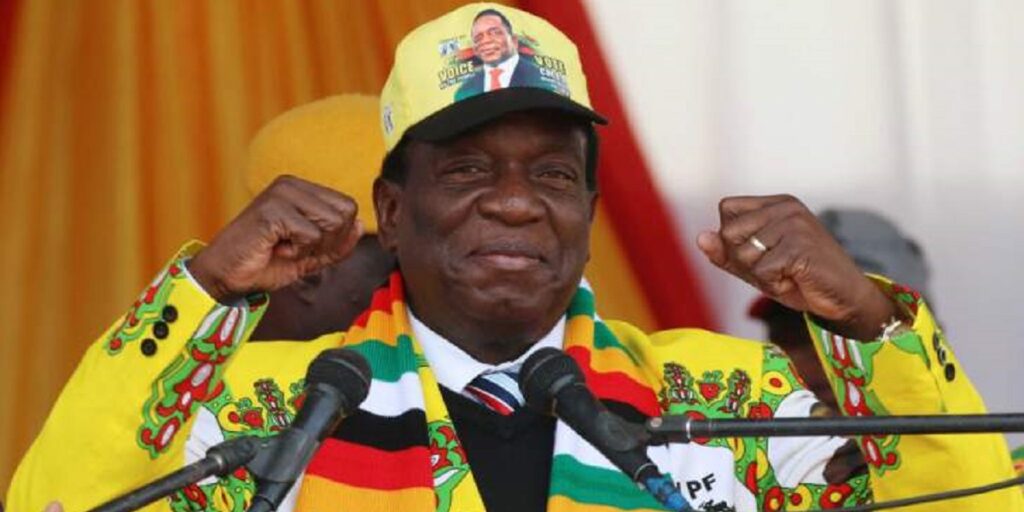Mnangagwa won’t be contested at Zanu PF congress: Mutsvangwa

President Mnangagwa gunning for a third term
Chiwengwa hasn’t received any nomination from party structures
PRESIDENT Emmerson Mnangagwa will not be contested at Zanu PF’s elective congress next month which will go ahead regardless of a court bid to block it and murmurings of disappointment by Vice-President Constantino Chiwenga’s backers who believe the party strongman has violated the 2017 coup agreement by holding onto power instead of passing the baton to his deputy.
Chiwenga was the commander of the Zimbabwe Defence Forces when the coup, which toppled the then president Robert Mugabe, occurred.

The former military general’s backers insist Mnangagwa and Chiwenga had an “unwritten agreement” that the President would serve only one term and thereafter hand over power to his deputy.
In an interview with The NewsHawks, Christopher Mutsvangwa (pictured), the Zanu PF spokesperson, claimed the congress, which will be the first to be held without Mugabe who died on 6 September 2019, would pass the test of democracy. He also said former members of the G40 faction, who were aligned to Mugabe and his wife Grace, have no business commenting on the party’s affairs.
Asked to respond to reports that some Zanu PF members want Chiwenga to replace Mnangagwa in accordance with their “unwritten agreement”, Mutsvangwa said:
“We hear rumblings to that effect from those who are outside the membership of the party. Best if they can become party members so their rumblings can get the opportunity to be debated and addressed. Otherwise if they feel genuinely aggrieved, the 2013 constitution of Zimbabwe allows for them to form their own parties in league with those fretting outside of party structures and membership. Zimbabwe is not a one-party state.”
Chiwenga’s faction is mainly militarily based.
Mutsvangwa said the nomination process ahead of congress is underway, adding only Mnangagwa has been nominated.
On 17 July this year, a former Zanu PF youth leader, Jim Kunaka, said Mnangagwa should honour the 2017 coup agreement and hand over power to Chiwenga.
At that time Kunaka, who now fronts the Zanu PF Original outfit, said: “If they had agreed with General Chiwenga that he would give him five years to rule, what prompted him to change today, that he refuses to give him a chance? There is no need to go for congress.”
“He (Mnangagwa) must honour what he agreed with Chiwenga that he would rule for a single term. He has already created parallel structures — Varakashi, Young Women for ED, Men BelievED … Those are now people who are loyal to him and not the organisation itself.”
Former Zanu PF youth commissar Godfrey Tsenengamu, who now leads the opposition Front for Economic Emancipation in Zimbabwe, expressed similar sentiments, warning that if Zanu PF fielded Mnangagwa in the next elections the party would lose.
In August, a Zanu PF card-carrying member, Sybeth Musengezi, filed an urgent High Court application seeking a prohibitory order to interdict the ruling party’s coming congress.
He insisted that Mnangagwa was ushered into office following an unlawful special session of Zanu PF’s central committee which was convened by unknown people, including two prominent politicians Patrick Chinamasa and Obert Mpofu in violation of the party’s constitution.
Musengezi accused the convenors of taking advantage of the then unfolding “Operation Restore Legacy” to topple Mugabe.
However, Mutsvangwa said next month’s congress will still go ahead irrespective of the court bid.
“No judgement has been rendered yet. We cannot arrest a party congress simply because of bad faith desire,” he said.
He reiterated that Mnangagwa will be uncontestable at congress because no member has been nominated by the party structures.
“Candidates come from elective processes of the party organs. I am not aware of any other candidate to date,” he said.
The spokesperson also emphasised that post-Mugabe, the congress would be historic.
“The fundamental issue is about people and democratic practice. Grace Mugabe and her G40 cohorts were bent on setting up a family dynastic monarchy.
President EDM and his Second Republic thwarted that anti-democratic streak. President EDM has lost no time in restoring the revolutionary republican ethos of Zanu PF,” said Mutsvangwa.
Mnangagwa was fired from the government by Mugabe in November 2017 for various allegations that included “lack of probity” and undermining the long-time ruler.
Two days later he was expelled from Zanu PF following “recommendations that were made by all the party’s 10 provincial co-ordinating committees”.
He escaped into exile in South Africa via Mozambique before returning to take over the leadership of the party and government after the military coup.
Musengezi told the High Court that the central committee does not have the power to reinstate a member who stands expelled from Zanu PF without that member following due process under the party constitution.
He said it was therefore illegal for the committee to purport to reinstate expelled members as well as Mnangagwa in absentia to the position from which he had been lawfully dismissed.
He said it was illegal for Chinamasa to purport to usurp and discharge the functions of the secretary for administration.




